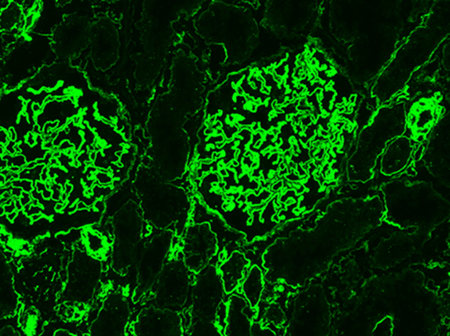Home > News > AMSBIO: Heparan Sulfate Antibodies Applications Guide
AMSBIO: Heparan Sulfate Antibodies Applications Guide
AMSBIO has produced a new 24-page guide that brings together applications, protocols, results and citations to provide an informative resource for researchers using heparan sulfate antibodies.
Heparan Sulfate (HS) is synthesized as the glycosaminoglycan (GAG) component of heparan sulfate proteoglycans (HSPGs). It is expressed on the cell surface of virtually all cell types and basement membranes. It displays specific interactions with many biologically active proteins and, thus is involved in many important biological processes. Many researchers are interested in examining the dynamic distribution of HSPG in tissues and also analyzing HS structures to elucidate the biological functions of HSPG. The non-immunogenic character of HS makes this type of antibody difficult to raise, so the few hybridoma-derived mouse anti-HS antibodies such as JM403, 10E4 and 3G10 are valuable tools for HS research. Using multiple HS antibodies that recognize subtle differences in HS patterning can be useful in applications such as flow cytometry allowing multiple cell types to be directly compared.
Heparan Sulfate (HS) is synthesized as the glycosaminoglycan (GAG) component of heparan sulfate proteoglycans (HSPGs). It is expressed on the cell surface of virtually all cell types and basement membranes. It displays specific interactions with many biologically active proteins and, thus is involved in many important biological processes. Many researchers are interested in examining the dynamic distribution of HSPG in tissues and also analyzing HS structures to elucidate the biological functions of HSPG. The non-immunogenic character of HS makes this type of antibody difficult to raise, so the few hybridoma-derived mouse anti-HS antibodies such as JM403, 10E4 and 3G10 are valuable tools for HS research. Using multiple HS antibodies that recognize subtle differences in HS patterning can be useful in applications such as flow cytometry allowing multiple cell types to be directly compared.

AMSBIO offers a suite of high quality heparan sulfate antibodies from the important clones F69-3G10, F58-10E4 and JM403. These antibodies are ideal for targeted binding of HS for HSPG research and provide a range of anti-HS antibodies recognizing distinct HS substructures, which have been well-characterized in previous studies. The guide provides an informative introduction to applications of JM403, 10E4 and 3G10 Heparan Sulfate antibodies; including use of the 10E4 and JM-403 clones together in ELISA to detect or measure HS. GAGs are not species-specific, so in common with AMSBIO’s other GAG antibodies, the clones featured in this guide react across a wide range of species.
Johan van der Vlag, Associate Professor at Radboud University Medical Center, Nijmegen commented “I am extremely happy to see that our JM403 clone is commercially available to serve the scientific community that studies the role of GAGs in normal physiology and pathology. Since we only want to licence our antibody to a company that is dedicated to glycobiology and in particular GAGs, AMSBIO was our only choice.”
To download the Heparan Sulfate Antibodies Applications Guide please visithttp://www.amsbio.com/heparan-sulfate-antibodies.aspx or contact AMSBIO on +44-1235-828200/ +1-617-945-5033 / info@amsbio.com.
Founded in 1987, AMS Biotechnology (AMSBIO) is recognized today as a leading company contributing to the acceleration of discovery through the provision of cutting-edge life science technology, products and services for research and development in the medical, nutrition, cosmetics and energy industries. AMSBIO is able to draw upon in-depth expertise in extracellular matrices to provide elegant solutions for studying cell motility, migration, invasion and proliferation. Widely acknowledged as an expert in cell culture, AMSBIO partners with clients in tailoring cell systems to enhance organoid and spheroid type screening outcomes from a technological and cost-effective perspective.
Johan van der Vlag, Associate Professor at Radboud University Medical Center, Nijmegen commented “I am extremely happy to see that our JM403 clone is commercially available to serve the scientific community that studies the role of GAGs in normal physiology and pathology. Since we only want to licence our antibody to a company that is dedicated to glycobiology and in particular GAGs, AMSBIO was our only choice.”
To download the Heparan Sulfate Antibodies Applications Guide please visithttp://www.amsbio.com/heparan-sulfate-antibodies.aspx or contact AMSBIO on +44-1235-828200/ +1-617-945-5033 / info@amsbio.com.
Founded in 1987, AMS Biotechnology (AMSBIO) is recognized today as a leading company contributing to the acceleration of discovery through the provision of cutting-edge life science technology, products and services for research and development in the medical, nutrition, cosmetics and energy industries. AMSBIO is able to draw upon in-depth expertise in extracellular matrices to provide elegant solutions for studying cell motility, migration, invasion and proliferation. Widely acknowledged as an expert in cell culture, AMSBIO partners with clients in tailoring cell systems to enhance organoid and spheroid type screening outcomes from a technological and cost-effective perspective.
Image caption: “Immunofluorescence staining on human kidney sections using JM403 Heparan Sulfate antibody (Image courtesy of Johan van der Vlag, Radboud University Medical Center, Nijmegen, The Netherlands)”
---------------------
Worldwide HQ
AMS Biotechnology (AMSBIO)
184 Milton Park
Abingdon
Abingdon
Oxon OX14 4SE
North American HQ
AMSBIO LLC
1035 Cambridge Street
Cambridge
MA 02141
USA
Tel: +1.617.945.5033
Tel: +1.800.987.0985 (toll free)
Email: info@amsbio.com
Web www.amsbio.com
1035 Cambridge Street
Cambridge
MA 02141
USA
Tel: +1.617.945.5033
Tel: +1.800.987.0985 (toll free)
Email: info@amsbio.com
Web www.amsbio.com
Media Contact
Dr Bill Bradbury info@primetek-solutions.com
Related News
- Ultra Smooth Hyperbolic Mirrors 2/9/2026
- Low Binding DNA Consumables for NGS and Molecular Biology 1/30/2026
- Creative BioMart Launches GenePowerTM Controlled Randomization to Support Precis 1/29/2026
- Biotech Fluidics: Instrument Optimized Vacuum Degassers. 1/28/2026
- High Speed Framing Cameras for Fusion Research 1/21/2026
- Tri-coded Storage Tube Optimized for Maximum Sample Recovery 1/16/2026
- Optimised UV Lenses for Forensic Investigation 1/16/2026
- Large Format Aerial Surveillance Lens 1/7/2026
- Breathing New Life into Older High-speed Cameras 1/7/2026
- New Handheld Decapper Boosts Speed and Consistency of 48-Format Tube Handling 1/6/2026


